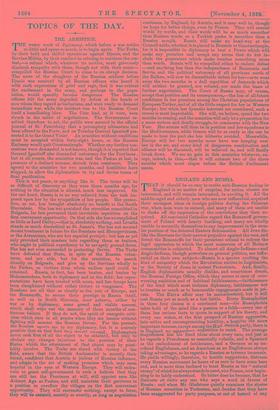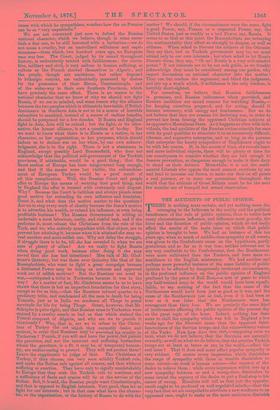ENGLAND AND RUSSIA. T HAT it should be so easy to
excite anti-Russian feeling in' England is no matter of surprise, for entire classes are interested, and will remain interested, in exciting it. All the middle-aged and elderly men who are now influential, acquired their strongest ideas on foreign politics during the Crimean war, when men were in earnest, and many of them are unable to shake off the impression of the convictions they then ac- quired. All convinced Catholics regard the Romanoff govern- ment of Poland with hearty loathing, and many are wholly unable to reconcile themselves to any improvement in the secu- lar position of the detested Eastern Schismatics. All Jews dis- like the Russians for their narrow prejudice against the race, and detest the Romanoffs for their persistent refusal to redress the legal oppression to which the most numerous of all Hebrew communities is subjected. To almost all Anglo-Indians—and Anglo-Indians, though powerless on general politics, are influ- ential on their own subject—Russia is a spectre exciting the kind of animosity which the Revolution excites in Legitimists, or the Society of Jesus in ardent Protestants. And, finally, English diplomatists usually dislike, and sometimes detest, the Russian Foreign Office, which they accuse at once of over- weening ambition and of habitual faithlessness,—faithlessness of the kind which most irritates diplomacy, faithlessness not to treaties so much as to honourable engagements made in pri- vate. The Khiva affair may be misunderstood, but it will cost Russia yet as much as a lost battle. Every Russophobist in these four classes is a convinced man—for Russophobia takes hold of the mind like a passion or a faith—every one of them has serious facts to quote in support of his theory, and every one wakes, at the first prospect of Russian aggression, into active and uncompromising hostility, a hostility the more ch important because, except among the:_iiigh our party, there isl, in England no anteniclA" --ansposition to resist. The average mnignsnman has his fixed ideas about every race, and just as he regards a Frenchman as essentially volatile, and a Spaniard as the embodiment of intolerance, and a German as an un- refined Englishman, and an American as an Englishman always taking advantages, so he regards a Russian as tyranny incarnate. He yields willingly, therefore, to hostile suggestions, distrusts every Russian movement he hears of as sure to have some base end, and is more than inclined to treat Russia as the "natural enemy" of which he always stands in need, vice France, now begin- ning to be fairly understood. So bitter does he become, that he distrusts o,b initio any one who says a word in favour of Russia ; and when Mr. Gladstone quietly examines the stories of Russian atrocities in Turkestan, and decides that they have been exaggerated for party purposes, or out of hatred of any cause with which he sympathises, wonders how the ex-Premier can be so "very unpatriotic." We are not concerned just now to defend the Russian national character, which we believe, though in some essen- tials a fine one, to be still leavened with a barbarism—we do not mean a cruelty, but an uncivilised wilfulness and capri- ciousness—from which, two hundred years ago, no European race was free. The Court, judged by its record throughout history, is undoubtedly tainted with faithlessness ; the execu- tive, military and civil, is very callous to human suffering, as callous as the French showed themselves in Algeria ; and the people, though not ambitious, but rather disposed to lethargic content, are undoubtedly possessed by desires for the possession of their Mecca, Constantinople, and of the water-way to their own Southern Provinces, which have precisely the same effect. There is no reason in the national character that we know of why we should not fight Russia, if we are so minded, and some reason why the affiance between the two peoples which is ultimately inevitable, if British dominance in Southern Asia is not to be a source of horrible calamities to mankind, instead of a source of endless benefits, should be postponed for a few decades. If Russia and England fight in Asia, Asia will be ruined ; but the fight, or its alter- native, the honest alliance, is not a question of to-day. But we want to know what there is in Russia as a nation, in her character, or her organisation, or her purposes, which should induce us to declare war on her when, by our own acknow- ledgment, she is in the right. There is not a statesman in England, except possibly Lord Beaconsfield, who does not acknowledge that the political self-government of the Turkish provinces, if attainable, would be a good thing ; that the finest section of Europe has been misgoverned long enough, and that if the means were but visible, the enfranchise- ment of European Turkey would be a good result of all this complication. Well, the Russian Court and people offer to Europe the means of securing that good thing, and in England the offer is treated with contumely and disgust. Why ? Because the Court is faithless and always pleads some good motive for extending its own influence and dominion. Grant it, and what does the motive matter to the question? Are we to stop every work of charity because the donor's motive is to advertise his wealth, or extend his influence, or even bring profitable business? The Russian Government is willing to undertake a most laborious, costly, and riskful task, and if she performs it, must release the Christians from the rule of the Turk, and we, who entirely sympathise with that object, are to prevent her attaining it, because when it is attained she may re- veal another and more selfish one. Why not delay the straggle, if struggle there is to be, till she has revealed it, when we are sure of plenty of allies Are we really to fight Russia when doing good work, because after doing it she may reveal that she has bad intentions ? Men talk of Mr. Glad- stone's Quixotry, but was there ever Quixotry like that of the Russophobists, who want to fight a great campaign because a distrusted Power may be doing an arduous and approved work out of selfish motives ? But the Russians are cruel in war,—extirpated a tribe in Turkestan because it was in the way ? As a matter of fact, Mr. Gladstone seems to us to have shown that there is but an imperfect foundation for that story, except so far as this,—that the Russians refused quarter to a predatory tribe, and condemned all the men to death for being Yomuds, just as in India we condemn all Thugs to penal servitude for life for being Thugs. Grant, however, that Mr. Schuyler is quite right, and that Russian arms in Turkestan were stained by a cruelty nearly as bad as that which stained the French conquest of Algeria, and why are we to punish it vicariously I Why, that is, are we to refuse to the Christ- ians of Turkey the rdd which they earnestly desire and entreat, in order that Russians inarbo-p¢nialled. for cruelty in Turkestan Punish, if you will and have the power,but inHui the garotters, and not the innocent and suffering bystanders whom the garotters, in a fit, it may be, of temporary human- ity, are endeavouring to protect. They will not protect them? Leave the supplicants to judge of that. The Christians of Turkey, if they choose, can very soon solidify Turkish rule, • and make the Sultan safe against all corners, and that without suffering or exertion. They have only to signify unmistakably to Europe that they wish the Turkish rule to continue, and a sufficiency of fleets and armies will be at the service of the Sultan. But, it is said, the Russian people want Constantinople, - and that is opposed to English interests. Very good, then let us - fight for our interests ; but in that case what have the charac- ter, or the organisation, or the history of Russia to do with the matter ? We should, if the circumstances were the same, fight a good Power, say, France, or a respected Power, say, the United States, just as readily as a bad Power, say, Russia. It seems to us that at this point the Russophobists are betraying the sentimentality they affect so strongly to despise, as well as silliness. When asked to liberate the subjects of the Ottoman they say that, bad as Turkish government may be, we must attend only to our own interests ; but when asked to let Russia liberate them, they say, "Oh no ! Russia is a very evil-minded power." If our interests are to be our sole guide, as we frankly acknowledge they must be considered among our guides, why import discussions on national character into the matter They can but confuse the argument, and blind the judgment, and stir up a wrath which, if selfishness is the only wisdom, is horribly short-sighted.
For ourselves, we believe that Russian faithlessness in promises, and Russian callousness when provoked, and Russian ambition are sound reasons for watching Russia,— for keeping ourselves prepared, and for acting, should it become necessary, with energy and fearlessness. But we do not believe that they are reasons for declaring war, in order to prevent her from freeing the oppressed Christian subjects of an oppressive Mussulman State. As it happens so often with indi- viduals, the bad qualities of the Russian nation coincide for once with its good qualities to stimulate it to an excessively difficult, irksome, and expensive enterprise, and so long as she pursues that enterprise the hearty sympathies of Englishmen ought to be with her course. If, in the course of time, she reveals baser and more individual objects, there will be plenty of time for our countlynien to consider whether they are bad enough to deserve prevention, or dangerous enough to make it their duty to stand on their defence. Meanwhile, it is not the senti- mental Liberals who oppose the most earnest exertions by sea and land to increase our forces, to make our fleet on all points a real potency, or to warn our possessions throughout the world that the attitude of Great Britain must be for the next few months one of tranquil but armed observation.



































 Previous page
Previous page